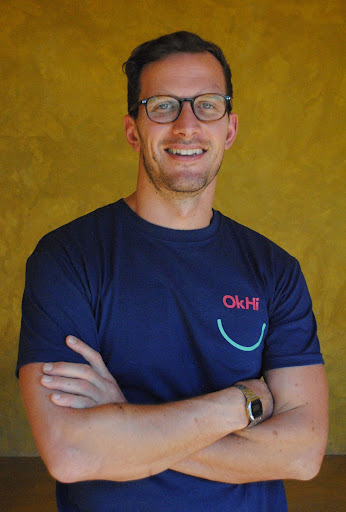OkHi is a smart addressing system, running on the core philosophy that an address is a human right – everyone deserves one. They take a unique approach to address people, not places. This means that they not only give an accurate location to a house, they can also prove who lives inside it. The outcome is smart addressing infrastructure that unlocks both efficient deliveries, post, emergency services, as well as identity verification and access to finance. Today, OkHi is focused on address verification, making it easy for businesses to verify their customer’s addresses through their smartphone, replacing the need for utility bills, in-person visits, and manual processes. They have ambitious plans to scale the business to 4 billion without a physical address.
In a question and answer (Q&A) with Tech in Africa, an optimistic Timbo Drayson details his entrepreneurial journey and how he believes OkHi’s revolutionary smart technology solution offers a local solution to Africa’s KYC challenges.
Your smart addressing solutions seem to be well suited for emerging markets. Why was Africa your first choice?
I was working for Google in London, and before I sold my soul to Silicon Valley, I decided to take a sabbatical to travel around East and West Africa to learn about the different problems there were to solve. After interviewing over 100 businesses, it was clear that the problem that was a common denominator across everyone was lack of addressing. I decided to quit my job and founded OkHi in Kenya with 4 other co-founders.
Please tell us more about your participation in the Facebook commerce accelerator program and the impact it has on your product offering.
A key factor around commerce is deliveries and how to make the whole end-to-end experience seamless, and delivery as cost-effective as possible. We learned a lot about Facebook’s vision for commerce, but most valuable of all was spending time with great mentors and experts.
Talk a little more about smart addressing as a major cost-cutting addition to institution operational processes.
A study by the MIT Media Lab in India looking at the cost of physical addressing on the economy estimates it as worth $14 billion, which could easily estimate to $200 billion globally in terms of inefficiency. Take financial services in Nigeria – if you open up a bank account, the bank has to send a physical agent to your door and verify your location. This can cost anywhere from ₦1000 to ₦2000 Naira ($2-$5+) and sometimes the process can drag on for weeks. Not only is it an expensive manual process, involving humans, it is also easy to defraud. Most importantly in the banking sector, time is money. Any day they are unable to transact due to customer sign-up delays is lost revenue. As per our pilot with Stanbic IBTC in Nigeria, our smart address verification product is four times faster, 30% more accurate, and is half the cost.
Since your first journey as a company in Africa, how long did it take for OkHi to achieve PMF and create a solution unique to the needs of the continent?
It has been a journey. Addressing is a huge challenge and over the course of our company’s life, we have solved different parts of it. In Kenya, we hit product-market-fit in the delivery space – we had a database of 300k addresses, paying customers, and compelling metrics. However, the bigger opportunity was a pivot to Nigeria to solve address verification, where we are now going live with our first set of customers, Quickteller being the first, which is extremely exciting.
Is the regulatory regime favorable in your markets of operation? What do you feel can help catalyze the innovative environment further from a legislative or regulatory standpoint?
Favorable conditions are created by two dynamics: the strength of the regulation, in particular pertaining to address verification and the level of innovation of that regulator. One of the reasons we came to Nigeria was because those two dynamics are compelling. Businesses are forced to carry out address verification or face penalties, while the Central Bank of Nigeria has a proven track record of innovation when you look at their embracement of biometrics.
What advice can you give to entrepreneurs looking to employ smart digital solutions that help solve problems but are afraid of disrupting markets controlled by conservative institutional players?
It is important to understand the competition but it shouldn’t stop your urge to solve a problem. If you live life by optimizing on the “what ifs” you won’t get a chance or opportunity to do anything. If you see a big problem, go ahead and try to solve it. Even if the startup does not achieve what it initially intended, it can pivot its business model and opportunity will always follow. With the right determination and resilience, you will always find a way despite challenges that will get thrown your way.
What can we expect from OkHi in the near and foreseeable future?
Right now, we are focused on solving address verification for financial services and any business in Nigeria that needs to know where their customers live. We then plan to work with mobility businesses across food and courier deliveries, ecommerce, ride-hailing, and emergency services. The output for Nigerians will mean they have a smart OkHi address they can use or share with anyone with one simple tap of the app.
Find out more on https://www.okhi.com/



